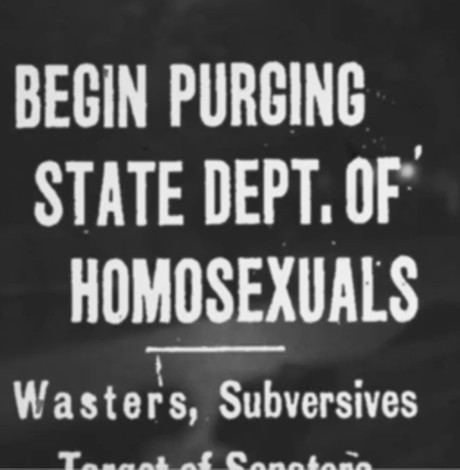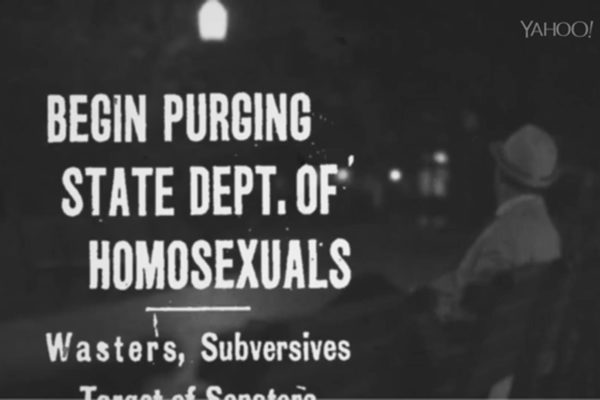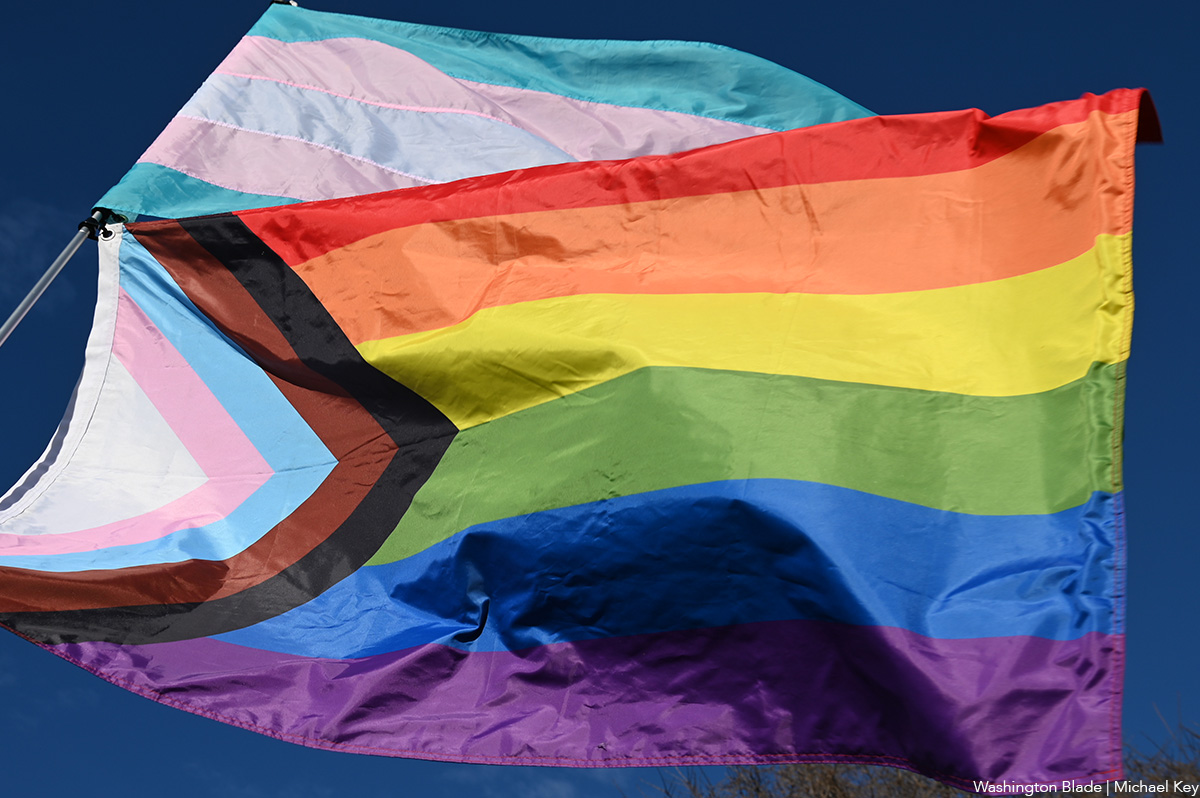Opinions
The undead anti-gay past
Unearthing the lost history of government persecution


A scene from ‘Uniquely Nasty: The U.S. Government’s War on Gays.’ (Screen capture courtesy Yahoo News)
The attention paid to the compulsively lying, brazenly ignorant grifter in the Oval Office, while legitimate and necessary, provides cover for Republican efforts to reverse decades of progress on a host of issues and to undermine our representative democracy. These threats require multitasking and division of labor among those resisting the slide toward authoritarianism.
An instructive lesson is found in the often lost and buried history of anti-gay discrimination in America. The animus behind that discrimination is alive and well, like the racial, gender, and religious biases which are its cousins. The strategy that has gained momentum in state legislatures since the landmark 2015 marriage equality victory in Obergefell goes by the false monicker of “religious freedom.” It is no more about freedom than it was when restauranteurs refused service to people whose skin color they didn’t like.
If your concept of freedom is exclusive to one group, then you are defending not freedom but supremacy. The social contract on which our republic is based requires mutual respect. This “inescapable network of mutuality,” as Dr. King put it, is both inseparable from the American project and targeted by equality’s enemies in each generation.
The 30-minute documentary Uniquely Nasty: The U.S. Government’s War on Gays, produced by Yahoo News and reported by Michael Isikoff, received an Edward R. Murrow Award in the News Documentary category in 2016. It portrays efforts by the Mattachine Society of Washington, originally founded by the late Frank Kameny but with a new mission of archive activism under the leadership of Charles Francis and Pate Felts. With help from pro bono attorneys at McDermott, Will & Emery, Mattachine has combed through archives and newly declassified documents “to educate and motivate a new generation of thought leaders, the legal community and the media.”
The deadly consequences of anti-gay persecution are illustrated in Uniquely Nasty by the story of Wyoming Senator Lester Hunt, who was blackmailed by henchmen of Sen. Joe McCarthy over the arrest of Hunt’s son for soliciting sex with a male undercover officer in Lafayette Park, and shot himself to death in his Senate office in 1954. Few people know that story today, though it inspired the bestselling novel and movie Advise and Consent.
Another forgotten bit of history unearthed by Mattachine after Uniquely Nasty was a report by the Mississippi State Sovereignty Commission in 1964 that was used to scuttle voter registration and civil rights work at Rust College, an HBCU in Holly Springs, MS, by smearing its president, faculty, and students as “oddballs and homos.” One Student Nonviolent Coordinating Committee activist at Rust who stirred the wrath of state officials that year was Frank Smith, who decades later served four terms on the D.C. Council and founded the African American Civil War Memorial and Museum.
Francis, who moderated a July 17 panel discussion on the Rust episode as part of the March on Washington Film Festival, calls it “a classic example of homophobia in service to racism.” Can you say intersectionality?
One of the treats in Uniquely Nasty is listening to actor George Takei read from long-hidden memos by FBI director J. Edgar Hoover, the closet case who persecuted generations of “homos.” Another is watching the 2015 seaside gay wedding of Charlie Baker, who fought back with help from Kameny after being fired by the National Bureau of Standards in 1971.
The official justifications for the persecution explored in Isikoff’s documentary went from the old “security risk” canard (the evidence-free claim that gays posed such a risk was akin to the current “voter fraud” pretext for vote suppression), to the citation of popular revulsion toward homosexuality. My own 32-year federal career, from 1979 to 2011, was made possible by the struggles of brave people like Kameny and Baker.
In connection with Uniquely Nasty, Yahoo News published a cache of long-secret government memos uncovered by Mattachine. Persistent anti-LGBT persecution efforts like Mississippi’s HB 1523 teach us the importance of preserving and studying our history. As Mississippi novelist William Faulkner wrote, “The past is never dead. It’s not even past.”
Richard J. Rosendall is a writer and activist. He can be reached at [email protected].
Copyright © 2017 by Richard J. Rosendall. All rights reserved.
Commentary
Honoring 50 queer, trans women with inaugural ‘Carrying Change’ awards
Naming the people who carry our movements forward

By JUNE CRENSHAW and HEIDI ELLIS | Dear friends, partners, and community:
We write to you as two proud Black and Brown queer women who have dedicated our lives to building safer, bolder, and more just communities as leaders, organizers, policy advocates, and storytellers.
We are June Crenshaw and Heidi Ellis.
June has spent almost 10 years guiding the Wanda Alston Foundation with deep compassion and unwavering purpose, ensuring LGBTQ+ youth experiencing homelessness have access to stability, safety, and a path forward. Her leadership has expanded housing and support services, strengthened community partnerships, and helped shift how Washington, D.C. understands and responds to the needs of queer and trans young people. In her current role with Capital Pride Alliance, June advances this work at a broader scale by strengthening community infrastructure, refining organizational policies, and expanding inclusive community representation.
Heidi is the founder of HME Consulting & Advocacy, a D.C.–based firm that builds coalitions and advances policy and strategy at the intersection of LGBTQ+ justice and racial equity. Her work spans public service, nonprofit leadership, and strategic consulting to strengthen community-driven solutions.
We’re writing because we believe in intentional recognition — naming the people who carry our movements forward, who make room for those who come next, and who remind us that change is both generational and generative. Too often, these leaders do this work quietly and consistently, without adequate public acknowledgment or what one might call “fanfare,” often in the face of resistance and imposed solitude — whether within their respective spaces or industries.
Today, we are proud to introduce the Torchbearers: “Carrying Change” Awards, an annual celebration honoring 50 unstoppable Queer and Trans Women, and Non-Binary People whose leadership has shaped, and continues to shape, our communities.
This inaugural list will recognize:
- 25 Legends — long-standing leaders whose decades of care, advocacy, and institution-building created the foundations we now stand upon; and
- 25 Illuminators — rising and emerging leaders whose courage, creativity, and innovation are lighting new paths forward.
Why these names matter: Movement memory keeps us honest. Strategy keeps us effective. Recognition keeps us connected. By celebrating both Legends and Illuminators side by side, we are intentionally bridging histories and futures — honoring elders, uplifting survivors, and spotlighting those whose work and brilliance deserve broader support, protection and visibility.
Who will be included: The Torchbearers will represent leaders across a diverse range of sectors, including community organizing, public service, sports, government, entertainment, business, education, legal industry, health, and the arts — reflecting the breadth and depth of queer leadership today. They include organizers providing direct service late into the night; policy experts shaping budgets and laws; artists and culture workers changing hearts and language; healers and mutual-aid leaders; and those doing the quiet, essential work that sustains us all.
Intersectionality is our core commitment: identity in its fullness matters, and honorees must reflect the depth, diversity, and nuance of queer leadership today.
How you can engage: Nominate, amplify, sponsor, and attend. Use your platforms to uplift these leaders, bring your organization’s resources to sustain their work, and help ensure that recognition translates into real support — funding, capacity, visibility, and protection.
We are excited, humbled, and energized to stand alongside the women and non-binary leaders who have carried us, and those who will carry this work forward. If history teaches us anything, it’s that the boldest change happens when we shine light on one another, and then pass the flame.
June Crenshaw serves as deputy director of the Capital Pride Alliance. Heidi Ellis is founder of HME Consulting & Advocacy.
Opinions
In favor of healthcare for trans youth
Denying teenagers puberty blockers is a human rights offense

One of the hottest issues in America right now is that of gender affirming care for trans youth. Even people close to me — as close as parents and siblings and dear friends — voice their disapproval of letting trans or nonbinary adolescents (and those who are younger) receive appropriate healthcare in the form of puberty blockers and other medicines to prevent their original gender from onset, and instead establish a new gender that they feel comfortable in. This is a topic that I believe is highly contested among Democrats themselves, so I have taken extra time, patience, and detail to write this article. Out of all of the op-eds I have penned for the Blade, this is the one I have most prepared for.
Trans youth should be able to access quality gender affirming care. Denying these children and teenagers puberty blockers is a human rights offense.
Many older trans people in the current day report feeling “off” about their gender from a young age. The majority of us, myself included, didn’t have a vocabulary to describe our feelings, so we instead lived teenage years under this strange angst — this strange anxiety about our bodies that we couldn’t put a name to. Maybe a lucky few of us grew up in Manhattan, or some other elite coastal city, and were, for instance, raised by lesbian moms or gay fathers or were put into some scenario in which we had access to vocabulary such as “gender dysphoria,” “cisgender,” and “transgender.” I’ve only known one person who had this vocabulary handed to them, but they were intersex, so questions about their genitalia were asked from a young age. Other than that, the point is this: Many transgender people feel like something was wrong during childhood. And here is the other point to be made: Many youth in the current day feel that something is wrong. The difference now is that modern day youth have access to more puberty blockers, more hormones, and more grown ups who want the best for them, in addition to more evil and cruel grown ups who don’t.
Youth who are genuinely transgender — who will likely live the rest of their life as a new gender — are in so much pain that they often want to kill themselves. These kids, be they seven, eight, 11, or 13 years old, engage in extremely unhealthy thoughts about their bodies and lives. Doctors will see signs of suicidality from the get go: the kid might exhibit parasuicidal behavior, such as scratching their arm with a razor, they might think of jumping off of a building, and they generally will not want to wake up the next day to confront the bullies who will tease them about their hair, clothes, and identity. Opponents of gender affirming care for youth often don’t understand the wrath that gender dysphoria places on its beholder: they don’t understand how depressed, anxious, and overall terrorized these kids feel. They perhaps just think that these kids can live a normal adolescence, maybe cross dress on occasion, and wait to fix their bodies until they are of “sane” and “healthy” mind. But I want to ask parents out there if they really feel as if children and teenagers who are suicidal is healthy: Do you think that a boy who wants to be a girl but can’t is going to bed feeling happy? The answer is no.
It is totally unhealthy for trans youth not to be able to delay their puberty. It is unhealthy for them to have to sit and stew in this wretched, cruel, and twisted universe that scorns their label of a new gender. It is unhealthy for them to turn on CNN and watch as Marjorie Taylor Greene or the president of the United States calls them monsters, or says that they are somehow sick.
Don’t get me wrong — it is appropriate and necessary for these gender nonconforming youth to be screened by doctors. They should be vetted by psychiatrists, psychologists, primary care physicians, endocrinologists, and licensed social workers. A rigorous and intelligent process for evaluating their dysphoria and alleviating their symptoms should be in place. What they are experiencing, after all, is not healthy.
What is healthy is giving these youth access to a new channel of freedom — healthcare that makes their bodies more aligned with their minds and healthcare that will cause them to be less suicidal, and more in touch with their surroundings and school environment. These youth deserve a chance at life–a shot at success. They deserve to learn in schools where their teachers don’t get punished for asking for preferred pronouns. Boys deserve to wear dresses and girls deserve to cut their hair short. The world needs to relax about gender. We are the ones suffering, not you. We are the ones bearing the brunt of cruelty. Let us have healthcare when healthcare is appropriate.
Isaac Amend is a writer based in the D.C. area. He is a transgender man and was featured in National Geographic’s ‘Gender Revolution’ documentary. He serves on the board of the LGBT Democrats of Virginia. Contact him on Instagram at @isaacamend
Opinions
Team Rayceen’s hiatus is officially over
Reflecting on a dark year while looking forward to 2026

In 2026, many will analyze the last 12 years because Mayor Bowser’s administration will conclude at the end of her current third term. My focus on this time frame is that as of 2026, Team Rayceen Productions will have existed for a dozen years. We have been through six primary elections, five pivotal production faux pas, four personnel problems, three presidents, two presidential impeachments, and a pandemic — and we’re still here.
Although our mantra is that we are For the People, TRP (Team Rayceen Productions) is essentially a one-man band. While Rayceen Pendarvis is a renowned emcee and revered community leader, and TRP has talented co-hosts and cherished volunteers, administratively and creatively, from invoices and graphics to selecting guests for interviews or performers for events, I run the show. This can be daunting, as it is for the numerous volunteers and staff members with many community groups and local LGBTQ organizations that take on multiple responsibilities while struggling with limited funding, resources, and institutional support.
After my sense of disappointment (but not shock or surprise) at the results of the 2024 presidential election, I abandoned my dreams and plans for TRP under a Harris administration and activated Plan B: stepping back from my creative duties and letting the annual TRP winter hiatus continue indefinitely. I correctly predicted that events would be cancelled, funding would become unavailable, and that overall, 2025 would be bleak.
Halting work on the Team Rayceen YouTube channel caused me to realize that this one aspect of my responsibilities was essentially an unpaid full-time job, especially during election years, due to our numerous candidate interviews. I was producer, director, editor, and booking agent; I did everything except interview guests on camera. Those five years of creating videos and live streams were exhausting. With that not happening, I had the unfamiliar experience of having free time in 2025. Within 10 months, I read more books than I had in the past 10 years.
Throughout the year, I continued my duties not only as TRP administrator and archivist, I also remained Rayceen’s de facto manager, agent, publicist, and speechwriter. By summer, somewhat reluctantly, I had resumed some of my TRP creative duties when collaborations with Arena Stage were offered. In the autumn, TRP also returned for Art All Night Shaw and organized an LGBTQ town hall.
Moving forward, I have decided to recalibrate my TRP roles. Our hiatus is officially over, and now we are prioritizing collaborations and supporting other organizations. I am calling it the Team Rayceen Agenda for Community Engagement, the acronym being T.R.A.C.E., our outline of priorities for the New Year.
These are our current priorities within the LGBTQ community:
• Increasing and improving communication and collaboration among LGBTQ organizations and groups, including those that are new and smaller
• Honoring LGBTQ elders
• Increasing and strengthening intergenerational bonds among LGBTQ people
• Welcoming and engaging with local LGBTQ community members who are new to their identities, the geographic region, or adulthood
• Creating databases for booking local LGBTQ performers, DJs, and photographers
We hope to partner with an array of organizations for these agenda items:
• Increasing voter registration, education, and participation
• Informing voters about the candidates, as well as proposed legislation and ballot measures, including via community listening sessions and candidate debates, forums, and interviews
• Creating events that are inclusive and foster LGBTQ allyship and finding ways to cultivate allyship, with an emphasis on trans people
• Organizing efforts to unify various demographic groups, including Black and API communities, and creating opportunities to dialogue, socialize, and collaborate
• Creating new local awards that honor and acknowledge elders, young people, performers, content creators, and event organizers
My advocacy for Rayceen Pendarvis will also continue:
• More hosting and emcee bookings
• Acting roles and cameo appearances in films, TV series, web series, commercials, and music videos
• Music recording opportunities as a featured or backing vocalist
(If interested in anything listed above, please email us.)
I have hope that these things are achievable and that if we can bring the right people together, action could happen soon. I think people in the region are ready for change: not only is The National LGBTQ Task Force’s Creating Change Conference in D.C. this year, but the board of Capital Pride Alliance (CPA) has new leadership; capable people have become staff members at CPA, the Mayor’s Office of LGBTQ Affairs, and elsewhere; and qualified people are running for positions to lead or represent D.C. residents, in races that are open or competitive.
For those reasons, I feel that perhaps D.C., including its LGBTQ community, is not going to be a kakistocracy, plutocracy, oligarchy, and/or gerontocracy. I am less certain about the federal government. We shall see how much beyond 12 years TRP lasts and how much beyond 250 years the USA lasts, if indeed, during this fascist regime, the latter currently exists in any meaningful way.
I’ve been through nearly 12 years of Team Rayceen Productions. This includes organizing numerous special events, such as two Black History Month programs and two town hall discussions. We convened three online At-Large Councilmember Candidate Forums in 2020. We produced Rayceen’s Reading Room for D.C. Public Library for four consecutive years. We produced four variety shows for Artomatic. We have been involved with both Silver Pride and the defunct OutWrite LGBTQ Literary Festival for five years. We have assisted with District of Pride for six years. We produced seven Art All Night programs and partnered with Story District for seven years of the annual Out/Spoken event. We produced the final eight seasons of “The Ask Rayceen Show” (2012-2021) and 10 social mixers (Rayceen, Fix Me Up!). We created multiple live stream series and more than 900 YouTube videos. All without a big financier. C’est la vie.
Most remarkably, I got through all of last year, and I’m still here.
Zar is the mononymous founder of Team Rayceen Productions, community advocate, consultant, songwriter, and lifelong resident of the Capital region.

















